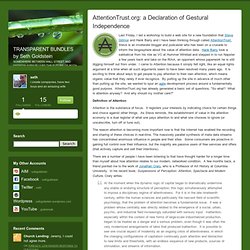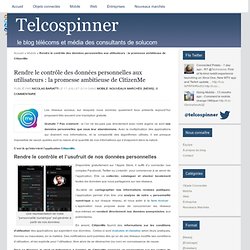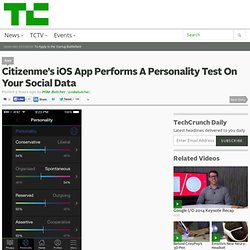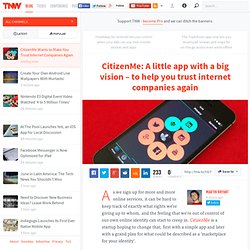

TRANSPARENT BUNDLES by Seth Goldstein: AttentionTrust.org: a Declaration of Gestural Independence. Last Friday, I led a workshop to build a web site for a new foundation that Steve Gillmor and Hank Barry and I have been thinking through called AttentionTrust.

Steve is an inveterate blogger and podcaster who has been on a crusade to inform the blogosphere about the value of attention data. Hank Barry took a sabbatical from his role as VC at Hummer Winblad and stepped in to run Napster a few years back and take on the RIAA, an opponent whose paperwork he is still digging himself out from under. I came to Attention because it simply felt right, like an equal rights argument at a time when all such arguments seem to have been resolved many years ago.
It is exciting to think about ways to get people to pay attention to their own attention, which means organic value that they rarely if ever recognize. By putting up the site in advance of much other than putting up the site, we wanted to spur an agile development process around a fundamentally good purpose. Rendre le contrôle des données personnelles aux utilisateurs : la promesse ambitieuse de CitizenMe. Les réseaux sociaux, sur lesquels nous sommes quasiment tous présents aujourd’hui proposent très souvent une inscription gratuite.

Gratuite ? Pas vraiment : si l’on ne les paie pas directement avec notre argent, ce sont nos données personnelles que nous leur abandonnons. Avec la multiplication des applications qui drainent nos informations, et la complexité des algorithmes utilisés, il est presque impossible de savoir quelles sont la nature et la quantité de nos informations qui s’évaporent dans la nature. C’est là qu’intervient l’application CitizenMe. Tim Berners-Lee: A Magna Carta for the web. CitizenMe wants to turn you into your own data broker. CitizenMe aide les internautes à prendre conscience de ce qu'ils acceptent sur le web. CitizenMe souhaite mieux protéger vos informations personnelles. Alors que les conditions d’utilisation des divers services web auxquels on s’inscrit deviennent de plus en plus complexes, il peut être difficile de s’y retrouver.

Heureusement, une application vient à la rescousse. CitizenMe Lite est une application mobile gratuite qui permet à son utilisateur de faire le suivi des conditions d’utilisation des divers réseaux sociaux et services web installés sur son téléphone. Citizenme’s iOS App Performs A Personality Test On Your Social Data. Data privacy and “owning your own data” online is a rather hard concept to get across to the average person.

But increasingly it’s a fundamental part of our existence online. One or two startups have tried to crack this idea. Datacoup in New York has a data exchange platform for consumers to aggregate and sell their own anonymous personal data for instance. Now Citizenme has launched an iPhone app today which attempts to let consumers to see all the data held about them by online companies, in a way that is easy to digest. Working with researchers at Cambridge University Psychometric Centre, Citizenme has built an algorithm to draw psychometric conclusions from that data. CitizenMe Wants to Make You Trust Internet Companies Again. As we sign up for more and more online services, it can be hard to keep track of exactly what rights we’re giving up to whom, and the feeling that we’re out of control of our own online identity can start to creep in.

CitizenMe is a startup hoping to change that; first with a simple app and later with a grand plan for what could be described as a ‘marketplace for your identity’. The CitizenMe iOS app has launched today with two main functions. The first is to keep track of the Terms of Service of popular apps installed on your phone. It flags up potentially controversial terms and a ‘traffic light’ system is used to highlight what’s good and bad about key points.